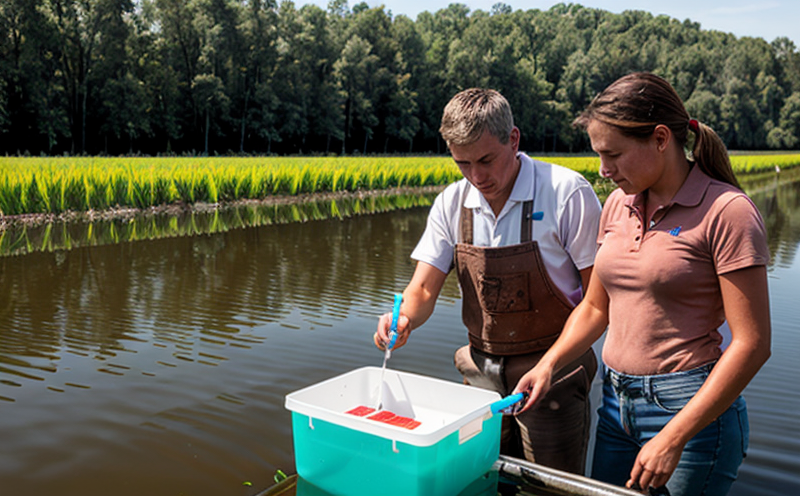Irrigation Water Quality Risk Assessment Testing
The quality of irrigation water plays a critical role in determining crop yield, soil health, and the overall sustainability of agricultural practices. Poor quality irrigation water can lead to various issues such as salinity build-up, nutrient imbalances, and reduced plant vigor. Therefore, conducting thorough risk assessments is essential for ensuring that irrigation systems are optimized and that water quality is managed effectively.
In this service, we provide comprehensive testing and evaluation of irrigation water to identify potential risks associated with its use in agricultural settings. Our approach involves a multidisciplinary team of experts who employ advanced laboratory techniques and international standards (ISO, ASTM, EN) to ensure accurate assessments. The testing covers parameters such as pH levels, salinity, nutrient content, heavy metals, and microbial contamination.
Our service includes the following steps:
- Initial water sample collection from various points within the irrigation system
- Preparation of samples according to standard laboratory procedures
- Analysis using state-of-the-art instrumentation including atomic absorption spectrophotometers, ion chromatographs, and microbial analysis systems
- Evaluation based on international standards such as ISO 14655 for water quality in agriculture
- Data interpretation and risk assessment report generation
The resulting reports provide actionable insights that help stakeholders make informed decisions regarding irrigation practices. This service is particularly beneficial for farmers, quality managers, compliance officers, and R&D engineers looking to enhance the sustainability of their operations.
| Parameter | Testing Methodology | Standard Reference |
|---|---|---|
| pH Levels | pH meter calibration followed by direct measurement | ISO 7027:1998 |
| Salinity | Dissolved solids measurement using conductivity meters | ASTM D1141-16 |
| Nutrient Content (Nitrogen, Phosphorus) | Colorimetric analysis with spectrophotometry | EN ISO 11269:2007 |
The data generated from these tests not only helps in identifying risks but also assists in developing mitigation strategies. By understanding the specific characteristics of irrigation water, stakeholders can implement targeted interventions such as changing the frequency or type of irrigation, adjusting fertilization schedules, or sourcing alternative water sources.
Our service is designed to meet the needs of various agricultural sectors including crop farming, livestock production, and horticulture. The insights derived from our testing can lead to significant improvements in resource efficiency and environmental sustainability.
Why It Matters
The importance of irrigation water quality cannot be overstated, especially given the increasing demands on agricultural resources worldwide. Poor water quality can have severe implications for crop health, yield, and overall sustainability. For instance, high salinity levels in irrigation water can lead to osmotic stress on plants, resulting in reduced growth rates and lower yields. Similarly, excessive nutrient concentrations can cause imbalances that favor weed growth over crops.
From a broader perspective, ensuring the quality of irrigation water is crucial for maintaining ecological balance within agricultural ecosystems. Overuse of fertilizers and other chemicals can lead to runoff into nearby water bodies, causing eutrophication and harming aquatic life. By conducting rigorous risk assessments, we contribute to the long-term health of both terrestrial and aquatic environments.
The economic implications are equally significant. Poor quality irrigation water can result in increased input costs due to the need for more frequent applications or higher-quality fertilizers. Additionally, it can lead to financial losses from reduced productivity or even crop failures if not managed properly.
In summary, our irrigation water quality risk assessment testing service is vital for protecting both natural resources and agricultural investments. It provides a foundation for sustainable practices that enhance productivity while minimizing environmental impact.
Industry Applications
| Agricultural Sector | Risk Factors Addressed |
|---|---|
| Crop Farming | Salt accumulation, nutrient imbalance, microbial contamination |
| Livestock Production | Pathogen presence, waterborne diseases |
| Horticulture | Salinity stress, pest management |
The data generated from our testing can be used in various ways across different agricultural sectors:
- Crop Farming: Identifying optimal irrigation schedules and fertilizer types to maximize yield while minimizing salt accumulation.
- Livestock Production: Ensuring the water supply is free from pathogens that could affect animal health.
- Horticulture: Monitoring salinity levels to prevent stress on delicate plant species and supporting integrated pest management strategies.
Our service also supports compliance with regulatory requirements, helping operators maintain sustainable practices that are in line with global standards.
Competitive Advantage and Market Impact
In today's competitive agricultural landscape, having a robust understanding of irrigation water quality can provide significant strategic advantages. By proactively addressing potential risks, stakeholders can enhance their operational efficiency and ensure consistent product quality.
Our service enables clients to:
- Evaluate the effectiveness of current irrigation practices against international benchmarks
- Identify areas for improvement that could lead to cost savings and increased productivity
- Demonstrate commitment to sustainability, attracting environmentally conscious consumers and investors
- Stay ahead of regulatory changes by maintaining compliance with evolving standards
The insights gained from our testing can be leveraged to develop innovative solutions that cater specifically to the needs of each agricultural sector. This not only enhances competitiveness but also contributes positively to market trends towards more sustainable practices.
In conclusion, investing in irrigation water quality risk assessment is an essential step toward achieving long-term success and sustainability in agriculture.





